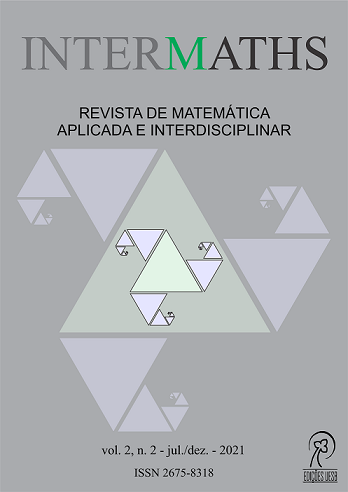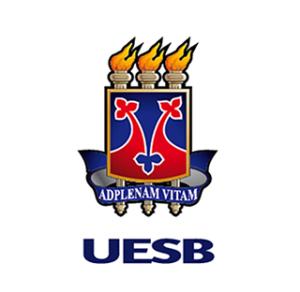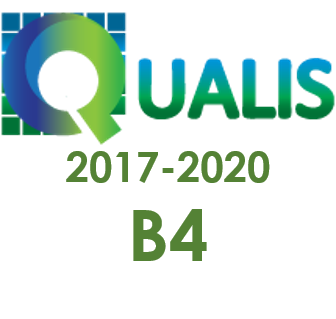Teaching Mathematics and Initial Teacher Education: An experience with social networks
DOI:
https://doi.org/10.22481/intermaths.v2i2.9808Keywords:
Social Networks, Pibid, math education, Teacher trainingAbstract
This work aims to present reflections and analyzes on the importance and influences of social networks in the construction of mathematical knowledge, highlighting their potential in the educational context in high school classes in three public schools in Vitória da Conquista - Bahia. The experiences exposed in this work were experienced in the remote modality by two scholarship holders in the Mathematics Subproject of the Institutional Program for Teaching Initiation Scholarships, at the State University of Southwest Bahia. For the development of such research, we chose to use social networks such as Instagram and Youtube, because these tools allow for more dynamic and faster interactions between their users. The results found were satisfactory, as it can be seen that social networks have the potential to assist in the teaching and learning process, they facilitate the sharing and dissemination of information, in addition to allowing greater communication/connection between educator and student, thus highlighting the relevance of using these means in classrooms.
Downloads
Metrics
References
CORONAVÍRUS deixa mais de 776 milhões de alunos fora da escola, diz UNESCO. UNIC Rio, 2020. Disponível em: https://unicrio.org.br/coronavirus-deixa-mais-de-776-milhoes-de-alunos-fora-da-escola-diz-unesco/. Acesso em: 20 ago. 2021
CUNHA, L. F. F da; SILVA, A. de S.; SILVA, A. P. da. O ensino remoto no Brasil em tempos de pandemia: diálogos acerca da qualidade e do direito e acesso à educação. Revista Com Censo: Estudos Educacionais do Distrito Federal, Brasília, v. 7, n. 3, p. 28, ago. 2020.
BRASIL. Parecer CNE/CP5/2020 - Reorganização do Calendário Escolar e da possibilidade de cômputo de atividades não presenciais para fins de cumprimento da carga horária mínima anual, em razão da Pandemia da COVID-19. Brasília: MEC, 2020.
FERREIRA, L. A et al. Ensino de matemática e covid-19: práticas docentes durante o ensino remoto. Revista EM TEIA. vol. 11, n 2, 2020.
SANTOS, K. E. O; CARVALHO, A. B. G. Mídias sociais e educação em tempos de pandemia: o Tiktok como suporte aos processos de ensino e aprendizagem. Revista EM TEIA. vol. 11, n 2, 2020.
ROCHA, C. M. F. As redes em saúde: entre limites e possibilidades, 2005. Disponível em: Estar em rede, ser rede: entre limites e possibilidades (fiocruz.br). Acesso em: 13 set. 2021.
DA SILVA, Siony. Redes sociais digitais e educação. Revista Iluminart, v. 1, n. 5, 2010.
SOFFNER, Renato. As tecnologias da inteligência e a educação como desenvolvimento humano. 2005. 144 f. Tese (Doutorado em Educação) – Faculdade de Educação, Universidade Estadual de Campinas, Campinas, 2005.
VIENS, Ashley. This graph tells us who's using social media the most. World Economic Forum. Disponível em: Who uses social media the most? | World Economic Forum (weforum.org). Acesso em: 13 set. 2021.
CRUZ, E. P. Brasil tem 24,3 milhões de crianças e adolescentes que usam internet. Agência Brasil. Disponível em: Brasil tem 24,3 milhões de crianças e adolescentes que usam internet | Agência Brasil (ebc.com.br). Acesso em: 14 set. 2021.
LORENZO, E. M. A utilização das redes sociais na educação: a importância das redes sociais na educação. 3 ed. São Paulo: Clube de Autores, 2013. 126p.
MORAN, J. M. A educação que desejamos: novos desafios e como chegar lá. - 5ª ed. - Campinas, SP: Papirus, 2012. 174p.
Downloads
Published
How to Cite
Issue
Section
License
Copyright (c) 2021 INTERMATHS

This work is licensed under a Creative Commons Attribution 4.0 International License.
- Responsibility: The scientific content and the opinions expressed in the manuscript are the sole responsibility of the author(s).
- Copyrights: INTERMATHS.
- All content of Revista INTERMATHS/INTERMATHS journal is licensed under a Creative Commons - Atribuição 4.0 Internacional







